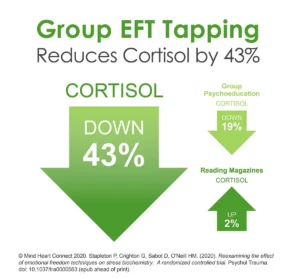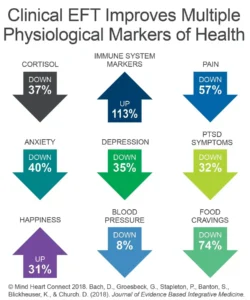What if there was a gentle, practical way to release trauma/PTSD (Post Traumatic Stress Disorder) and other negative beliefs and feelings to become your best version of yourself?
Clinical EFT (Emotional Freedom Techniques), also known as “tapping,” offers a unique approach to healing PTSD and trauma. Combining elements of exposure therapy, cognitive therapy, meridian therapy and somatic healing, EFT addresses both the emotional and physical effects of trauma.
Research shows that EFT reduces stress, alleviates trauma triggers and symptoms as it restores emotional balance—often in far fewer sessions than traditional therapies.
Why Self-Love Feels So Hard
For many of us, self-love—the practice of treating ourselves with loving care and unconditional acceptance—feels unnatural. Trauma survivors often struggle with deeply ingrained patterns of self-criticism and unworthiness, making it hard to silence that inner critical voice that says, “You don’t deserve to be loved.”
Self-love isn’t just about changing your mindset; it’s about creating safety within your body. Trauma isn’t just about what happened to you—it’s about how your body holds onto the stress of those experiences. When survival stress is trapped in your body, it can manifest as physical tension, pain, emotional overwhelm and self-criticism.
This is why traditional talk therapies alone are not generally enough. Trauma disrupts the brain’s ability to process emotions effectively, leaving survivors stuck in loops of shame and guilt.
Trauma survivors often have elevated levels of cortisol, our primary stress hormone, which keeps them in “fight and flight mode”.
 How Clinical EFT Tapping Can Help
How Clinical EFT Tapping Can Help
Clinical EFT addresses these barriers by combining three key healing mechanisms:
Somatic Regulation
The tapping process stimulates acupressure points, releasing trapped negative emotions and sending calming signals to the brain. This reduces activity in the amygdala—the brain’s fear centre—and can lower stress hormones like cortisol by 43% in a single session.
Cognitive Shifts
EFT uses affirming statements like, “Even though I feel this anxiety, I deeply and completely accept myself.” These statements help the brain hold two opposing truths—acknowledging the pain while fostering self-acceptance. This dual awareness has been shown to reduce depressive symptoms by nearly 50% in some groups.
Releasing Difficult Memories
Revisiting traumatic memories while tapping creates new, non-threatening associations in the brain. This reduces the emotional charge of the memory, making it easier to let go of all the negative feelings.
 The Science Behind EFT’s Effectiveness
The Science Behind EFT’s Effectiveness
EFT’s ability to create rapid and lasting change is backed by extensive research:
PTSD Treatment: A 2018 study found that veterans experienced a 53% reduction in PTSD symptoms after just 10 EFT sessions, with results maintained at six months.
Depression and Anxiety: Postmenopausal women saw a 47.45% decrease in depression symptoms after an 8-week EFT program, and workplace interventions reduced anxiety by 40%.
Stress Reduction: Group EFT sessions reduced cortisol levels by up to 43%, compared to 19% for psychoeducation and a 2% increase in control groups.
Faster Results: EFT often achieves results in fewer sessions than traditional therapies like CBT or EMDR, making it a cost-effective choice for trauma recovery.
Self-Love and Acceptance are the pathway to Root Cause Healing. When you treat yourself with compassion, you create positive feelings that help support emotional freedom and forgiveness.
EFT Tapping helps you build self-acceptance and self-love by:
Calming Overwhelming Feelings: Tapping provides an immediate way to regulate your nervous system during times of stress or emotional pain.
Releasing Emotional Trauma Triggers: Unlike traditional talk therapy, EFT allows you to process emotions linked to past traumas without needing to relive the details.
Building Self- Acceptance: By using affirming statements with tapping, EFT encourages you to treat yourself with the same compassion you’d offer a loved one.
When your body feels safe, self-love becomes more accessible—and healing follows naturally.
For Those Who Feel Stuck: Why EFT Tapping Might Be Right for You
If you’ve tried other approaches and still feel stuck, EFT offers a new path forward. Unlike therapies that focus solely on the mind, EFT works with the body’s stress response to address the root causes of emotional pain.
Whether you’re carrying the weight of trauma, battling self-critical thoughts, or struggling to forgive yourself, EFT provides a gentle, evidence-based way to release the past and reconnect with yourself.
Working with Me
As a trained Clinical EFT Practitioner, I specialise in creating a safe, supportive space where healing can happen at your own pace. Together, we can:
- Identify and release the emotions keeping you stuck.
- Re-frame painful memories without overwhelm.
- Build self-acceptance and emotional resilience step by step.
If you’re ready to explore Clinical EFT Tapping in a one-on-one session, I invite you to book an appointment with me. Our goal is to help you release the burden of all this trauma, frustration, and self-criticism so you can reconnect with your sense of self-love.




